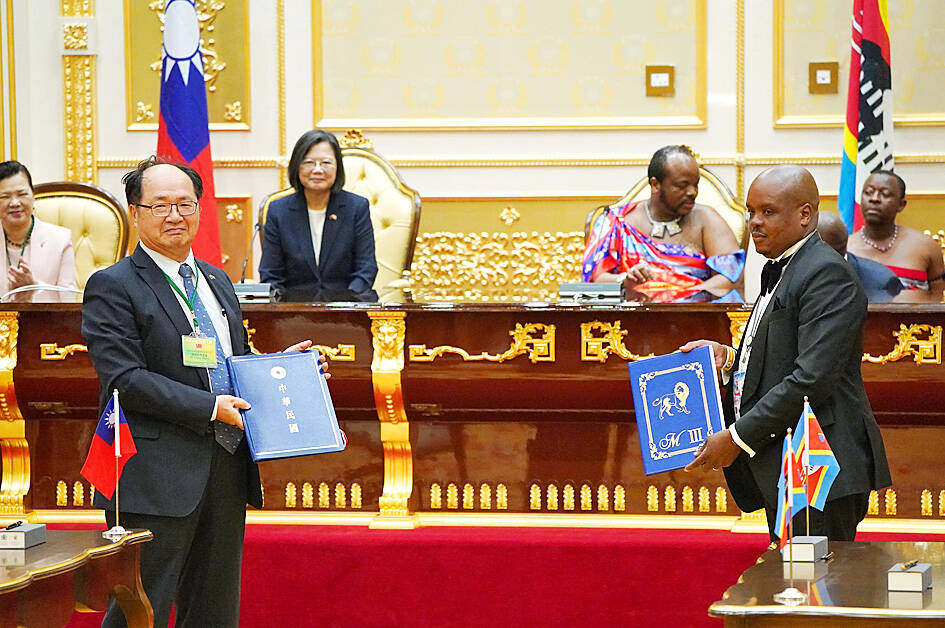Taiwan on Tuesday signed a memorandum of understanding to help the Kingdom of Eswatini, its only diplomatic ally in Africa, build an oil tank in the country.
Overseas Investment & Development Corp (OIDC, 海外投資開發股份有限公司) — a Taiwanese company focused on government aid projects overseas — has been contracted to build the strategic oil facility, Minister of Economic Affairs Wang Mei-hua (王美花) told reporters in Eswatini’s capital, Mbabane, after the memorandum of understanding was signed.
She did not go into detail, saying only that Eswatini had hoped to construct an oil tank that could store at least 30 days of oil reserves.

Photo: CNA
President Tsai Ing-wen (蔡英文), who is on a four-day visit to Eswatini, lauded the agreement as a milestone for relations between the two countries, the Presidential Office said in a news release.
Both sides have been in talks about the project for some time, she said during a meeting with Eswatini King Mswati III, adding that the planned facility would help ensure the African nation’s energy supply.
An Eswatini government Web site says the nation imports all of its oil from South Africa, leaving it susceptible to volatile international crude oil prices.
State oil company Eswatini National Petroleum Co (ENPC) has been mandated to build and operate oil reserve facilities as part of efforts to better ensure the nation’s oil supply.
Tuesday’s memorandum was signed by OIDC general manager Jeff Chung (鍾家富) and ENPC CEO Nhlanhla Dlamini.
OIDC was established in 1995 by state-run and private companies in Taiwan to undertake aid and infrastructure projects launched by the government in allied nations.
Officials at the ceremony also signed a deal to provide loans to female entrepreneurs in Eswatini and a sister-city agreement between Kaohsiung and Mbabane.
The financing agreement is part of a larger women’s empowerment project that Taiwan’s government launched in the African nation in 2020, Wang said.
As part of the project, the government has trained 5,000 Eswatini women in business and financial planning, she said.
Tsai also weighed in on the project, saying that she was glad that her government could fund the project and back women in Eswatini in the early phases of their businesses.
She also expressed hope that the sister-city agreement signed between Kaohsiung Mayor Chen Chi-mai (陳其邁) and Mbabane Mayor Vusi Tembe would facilitate more exchanges between the cities.
Chen told reporters after the ceremony that Kaohsiung was ready to share its experience with Mbabane in promoting information and communications technology, and facilitating the growth of small and medium-sized businesses.
Meanwhile, King Mswati III thanked Taiwan for continuing to support Eswatini’s development, adding that the three agreements marked an important step in the partnership between the two countries, the Presidential Office said.
The king, who has reigned over the last absolute monarchy in Africa since 1986, also encouraged more Taiwanese companies to invest in Eswatini, the office said.

The Ministry of the Interior (MOI) is to tighten rules for candidates running for public office, requiring them to declare that they do not hold a Chinese household registration or passport, and that they possess no other foreign citizenship. The requirement was set out in a draft amendment to the Enforcement Rules of the Public Officials Election and Recall Act (公職人員選舉罷免法 ) released by the ministry on Thursday. Under the proposal, candidates would need to make the declaration when submitting their registration forms, which would be published in the official election bulletin. The move follows the removal of several elected officials who were

The Republic of China (ROC) is celebrating its 114th Double Ten National Day today, featuring military parades and a variety of performances and speeches in front of the Presidential Office in Taipei. The Taiwan Taiko Association opened the celebrations with a 100-drummer performance, including young percussionists. As per tradition, an air force Mirage 2000 fighter jet flew over the Presidential Office as a part of the performance. The Honor Guards of the ROC and its marching band also heralded in a military parade. Students from Taichung's Shin Min High School then followed with a colorful performance using floral imagery to represent Taiwan's alternate name

FOUR DESIGNATED AREAS: Notices were issued for live-fire exercises in waters south and northwest of Penghu, northeast of Keelung and west of Kaohsiung, they said The military is planning three major annual exercises across the army, navy and air force this month, with the navy’s “Hai Chiang” (海強, “Sea Strong”) drills running from today through Thursday, the Ministry of National Defense said yesterday. The Hai Chiang exercise, which is to take place in waters surrounding Taiwan, would feature P-3C Orion maritime patrol aircraft and S-70C anti-submarine helicopters, the ministry said, adding that the drills aim to bolster the nation’s offshore defensive capabilities. China has intensified military and psychological pressure against Taiwan, repeatedly sending warplanes and vessels into areas near the nation’s air defense identification zone and across

A Chinese takeover of Taiwan would severely threaten the national security of the US, Japan, the Philippines and other nations, while global economic losses could reach US$10 trillion, National Security Council Deputy Secretary-General Lin Fei-fan (林飛帆) wrote in an article published yesterday in Foreign Affairs. “The future of Taiwan is not merely a regional concern; it is a test of whether the international order can withstand the pressure of authoritarian expansionism,” Lin wrote in the article titled “Taiwan’s Plan for Peace Through Strength — How Investments in Resilience Can Deter Beijing.” Chinese President Xi Jinping’s (習近平) intent to take Taiwan by force